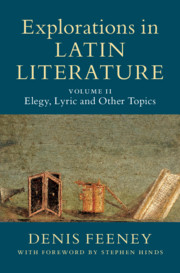Book contents
- Explorations in Latin Literature
- Explorations in Latin Literature
- Copyright page
- Dedication
- Contents
- Foreword
- List of Acknowledgements and Original Places of Publication
- Introduction
- Chapter 1 Si licet et fas est: Ovid’s Fasti and the Problem of Free Speech Under the Principate
- Chapter 2 ‘Shall I Compare Thee … ?’ Catullus 68B and the Limits of Analogy
- Chapter 3 Towards an Account of the Ancient World’s Concepts of Fictive Belief
- Chapter 4 Horace and the Greek Lyric Poets
- Chapter 5 Criticism Ancient and Modern
- Chapter 6 The Odiousness of Comparisons: Horace on Literary History and the Limitations of synkrisis
- Chapter 7 Una cum scriptore meo: Poetry, Principate, and the Traditions of Literary History in the Epistle to Augustus
- Chapter 8 Two Virgilian Acrostics: certissima signa?
- Chapter 9 Catullus and the Roman Paradox Epigram
- Chapter 10 Becoming an Authority: Horace on his Own Reception
- Chapter 11 Fathers and Sons: The Manlii Torquati and Family Continuity in Catullus and Horace
- Chapter 12 Doing the Numbers: The Roman Mathematics of Civil War in Shakespeare’s Antony and Cleopatra
- Chapter 13 Crediting Pseudolus: Trust, Belief, and the Credit Crunch in Plautus’ Pseudolus
- Chapter 14 Hic finis fandi: On the Absence of Punctuation for the Endings (and Beginnings) of Speeches in Latin Poetic Texts
- Chapter 15 Representation and the Materiality of the Book in Catullus’ Polymetrics
- Chapter 16 Catullus 61: Epithalamium and Comparison
- Chapter 17 Ovid’s Ciceronian Literary History: End-Career Chronology and Autobiography
- Chapter 18 Horace and the Literature of the Past: Lyric, Epic, and History in Odes 4
- Chapter 19 Forma manet facti (Ov. Fast. 2.379): Aetiologies of Myth and Ritual in Ovid’s Fasti and Metamorphoses
- Published Works of Denis Feeney
- Bibliography
- Index locorum
- General Index
Chapter 9 - Catullus and the Roman Paradox Epigram
Published online by Cambridge University Press: 05 August 2021
- Explorations in Latin Literature
- Explorations in Latin Literature
- Copyright page
- Dedication
- Contents
- Foreword
- List of Acknowledgements and Original Places of Publication
- Introduction
- Chapter 1 Si licet et fas est: Ovid’s Fasti and the Problem of Free Speech Under the Principate
- Chapter 2 ‘Shall I Compare Thee … ?’ Catullus 68B and the Limits of Analogy
- Chapter 3 Towards an Account of the Ancient World’s Concepts of Fictive Belief
- Chapter 4 Horace and the Greek Lyric Poets
- Chapter 5 Criticism Ancient and Modern
- Chapter 6 The Odiousness of Comparisons: Horace on Literary History and the Limitations of synkrisis
- Chapter 7 Una cum scriptore meo: Poetry, Principate, and the Traditions of Literary History in the Epistle to Augustus
- Chapter 8 Two Virgilian Acrostics: certissima signa?
- Chapter 9 Catullus and the Roman Paradox Epigram
- Chapter 10 Becoming an Authority: Horace on his Own Reception
- Chapter 11 Fathers and Sons: The Manlii Torquati and Family Continuity in Catullus and Horace
- Chapter 12 Doing the Numbers: The Roman Mathematics of Civil War in Shakespeare’s Antony and Cleopatra
- Chapter 13 Crediting Pseudolus: Trust, Belief, and the Credit Crunch in Plautus’ Pseudolus
- Chapter 14 Hic finis fandi: On the Absence of Punctuation for the Endings (and Beginnings) of Speeches in Latin Poetic Texts
- Chapter 15 Representation and the Materiality of the Book in Catullus’ Polymetrics
- Chapter 16 Catullus 61: Epithalamium and Comparison
- Chapter 17 Ovid’s Ciceronian Literary History: End-Career Chronology and Autobiography
- Chapter 18 Horace and the Literature of the Past: Lyric, Epic, and History in Odes 4
- Chapter 19 Forma manet facti (Ov. Fast. 2.379): Aetiologies of Myth and Ritual in Ovid’s Fasti and Metamorphoses
- Published Works of Denis Feeney
- Bibliography
- Index locorum
- General Index
Summary
The first person to write elegiac couplets in Latin, Ennius, already wrote a kind of epigram that we do not see in Greek: a paradox is stated, then a question is asked about the paradox, and an answer is given. The chapters shows the popularity of this ‘paradox epigram’ in Latin literature, particularly in Catullus and Martial, arguing that both of these poets, in different ways, deconstructed the form.
- Type
- Chapter
- Information
- Explorations in Latin Literature , pp. 139 - 149Publisher: Cambridge University PressPrint publication year: 2021

